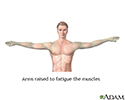Tensilon test
Myasthenia gravis-tensilon
The Tensilon test is a method to help diagnose myasthenia gravis .
Myasthenia gravis
Myasthenia gravis is a neuromuscular disorder. Neuromuscular disorders involve the muscles and the nerves that control them.

How the Test is Performed
A medicine called Tensilon (also called edrophonium) or a dummy medicine (inactive placebo) is given during this test. The health care provider gives the medicine through one of your veins (intravenously, through an IV). You may also be given a medicine called atropine before receiving Tensilon so that you do not know you are getting the medicine.
You will be asked to perform some muscle movements over and over again, such as crossing and uncrossing your legs or getting up from a sitting position in a chair. The provider will check whether the Tensilon improves your muscle strength. If you have weakness of the eye or face muscles, the effect of the Tensilon on this will also be monitored.
The test may be repeated and you may have other Tensilon tests to help tell the difference between myasthenia gravis and other conditions.
How to Prepare for the Test
No special preparation is usually necessary. Follow your provider's instructions about how to prepare.
How the Test Will Feel
You will feel a sharp prick as the IV needle is inserted. The drug may cause a feeling of a churning of the stomach or a slight feeling of increased heart rate, especially if atropine is not given first.
Why the Test is Performed
The test helps:
- Diagnose myasthenia gravis
- Tell the difference between myasthenia gravis and other similar brain and nervous system conditions
- Monitor treatment with oral anticholinesterase drugs
The test may also be done for conditions such as Lambert-Eaton syndrome .
Lambert-Eaton syndrome
Lambert-Eaton syndrome (LES) is a rare disorder in which faulty communication between nerves and muscles leads to muscle weakness.

What Abnormal Results Mean
In many people with myasthenia gravis, the muscles will improve right after the Tensilon. The improvement lasts only a few minutes. For some types of myasthenia, Tensilon can make the weakness worse.
When the disease gets worse enough to need treatment (myasthenic crisis), there is a brief improvement in muscle strength.
When there is an overdose of anticholinesterase (cholinergic crisis), Tensilon will make the person even weaker.
Risks
The medicine used during the test may cause side effects, including fainting or breathing failure. This is why the test is done by a health care provider in a medical setting.
References
Huff JS. Special neurologic tests and procedures. In: Roberts JR, Hedges JR, eds. Roberts and Hedges' Clinical Procedures in Emergency Medicine . 6th ed. Philadelphia, PA: Elsevier Saunders; 2014:chap 61.
Meriggioli MN, Sanders DB. Disorders of neuromuscular transmission. In: Daroff RB, Fenichel GM, Jankovic J, Mazziotta JC, eds. Bradley's Neurology in Clinical Practice . 6th ed. Philadelphia, PA: Elsevier Saunders; 2012:chap 78.
-
Muscle fatigue - illustration
Holding your arms above your shoulders until they drop is one exercise that may be performed during the Tensilon test. In this test, the drug Tensilon is administered, and the response in the muscles are evaluated to help diagnose myasthenia gravis or to help differentiate between myasthenia gravis and other conditions.
Muscle fatigue
illustration
-
Muscle fatigue - illustration
Holding your arms above your shoulders until they drop is one exercise that may be performed during the Tensilon test. In this test, the drug Tensilon is administered, and the response in the muscles are evaluated to help diagnose myasthenia gravis or to help differentiate between myasthenia gravis and other conditions.
Muscle fatigue
illustration
Review Date: 2/3/2015
Reviewed By: Amit M. Shelat, DO, FACP, Attending Neurologist and Assistant Professor of Clinical Neurology, SUNY Stony Brook, School of Medicine, Stony Brook, NY. Review provided by VeriMed Healthcare Network. Also reviewed by David Zieve, MD, MHA, Isla Ogilvie, PhD, and the A.D.A.M. Editorial team.

